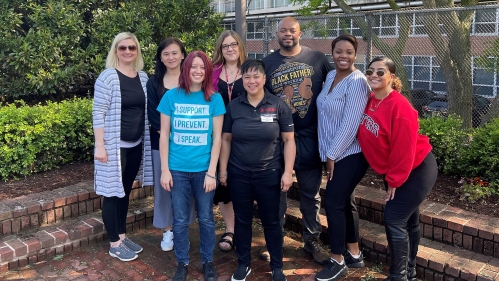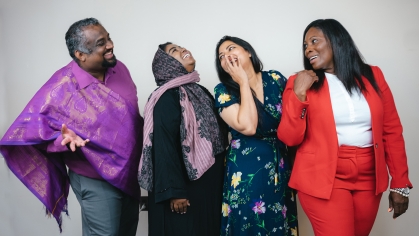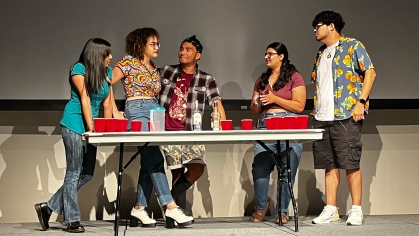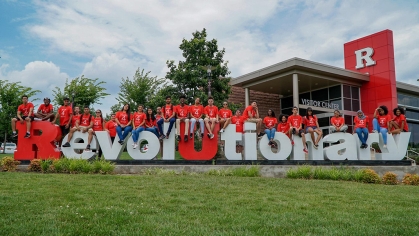CAPS’s team of Community Based Counselors Serve the Rutgers–New Brunswick Community

Although the majority of Student Health's CAPS’s counselors are located at 17 Senior Street on the College Avenue campus at Rutgers University–New Brunswick, the support service embeds counselors within departments, professional schools, and cultural centers through its community-based counseling (CBC) program.
“When we came up with the CBC program, we understood that not everyone was going to sit down one day and say, ‘I need to access mental health care. Let me call CAPS and make an appointment,’” said Francesca Maresca, who currently serves as both the interim director for Health and Wellness and as the director of Health Outreach, Promotion, and Education.
“But what if we had mental health care professionals who were embedded in the community itself?”
In 2016, CAPS began the program by embedding two counselors in the Division of Student Affairs’s cultural centers. Today, eight counselors now serve communities across campus, offering individual counseling sessions, tailored workshops, group therapy, and presentations.
“Each year, the program kept building on itself,” said Jennifer Jones-Damis, the acting director of CAPS. “We just kept adding two more clinicians at a time. Last summer, we added a clinician to Douglass Residential College because they saw a need for a counselor on their campus as well.
“Many campuses and schools are reaching out,” Dr. Jones-Damis continued. “They want somebody present because it makes a difference. Staff and faculty feel like, ‘Hey, I can hand students off to a counselor who’s right here in our building, who I know and who I’ve talked to before,’ versus, ‘here’s a number, call CAPS.’”
While each community-based counselor offers a variety of mental health resources, they tailor the focus and emphasis of their efforts to the needs of their academic and extracurricular environments.
For instance, Richard Carlson, who is embedded at the Mason Gross School of the Arts and the Ernest Mario School of Pharmacy, primarily focuses on individual counseling in his work.
“I happen to work in two places where there’s quite a need for individual psychotherapy, and I don’t get quite as many clients participating in presentations and workshops,” Carlson said. “Each session is different because each client is different, and our consultations are brief and solution-focused.”
Still, Carlson stressed the importance of community outreach, even if most of his work remains based in individual psychotherapy.
“I work closely with staff and faculty, and often consult with them about students that they’re concerned with,” Carlson said. “I also do presentations and workshops that educate them on how they can identify the needs of more distressed students, as well as how they can identify and reduce suicidality among the young adult student population on campus.”
As a counselor embedded in the Honors College and the Graduate Schools at Rutgers–New Brunswick, Shan Reeves splits his time between individual counseling, group therapy, and workshops that deal with topics such as meditation, breath, music, time management, and identity.
Although the day-to-day nature of his work differs from Carlson’s, Reeves also sees outreach as crucial to his position as a community-based counselor.
“Having clinicians in community spaces opens the door for a lot of students to engage in treatment, whether that’s through students coming to me for individual sessions or through my visits to their classrooms,” Reeves said.
“The program allows for me to reach out to students who might not have known about this service or given it a second thought,” Reeves said. “I’ve found that I can really help open up the space for conversations about mental health, and I do my best to show students that these conversations are signs of strength, not weakness.”
During the academic year and the summer, the CBC program has counselors embedded in fifteen schools, departments, cultural centers, and programs across campus. In the future, CAPS plans to continue expanding the CBC program to meet the needs of other places on-campus.
“With the volume of students on campus and the number of students that are trying to access services at CAPS, we could have a CBC in every department,” said Manda Gatto, assistant director community-based services at CAPS.
“Being realistic, though, we will be expanding into specific places of need, and a lot of CBCs are already embedded in environments with students who are either members of oppressed and marginalized communities or who don’t necessarily access mental health services,” said Gatto.
“With the size and diversity of Rutgers’s campus, there are plenty of opportunities for us to meet other areas of need.”
Other staff members echoed Gatto’s emphasis on the importance of outreach and the further expansion of the CBC program.
“Emotional wellness and mental health are the responsibilities of everyone at Rutgers,” said Dr. Maresca.
“If we only count on the people who stop by our counseling centers to be the ones addressing their mental and emotional wellness, we are not going to be successful.”
Financial support from alumni, parents, and friends helps us create the innovative learning opportunities that challenge students to be their best at Rutgers and beyond.
About the Division of Student Affairs at Rutgers–New Brunswick
The Division of Student Affairs is committed to facilitating interactions that promote students' success and their personal and professional development. Learn more about our mission.



